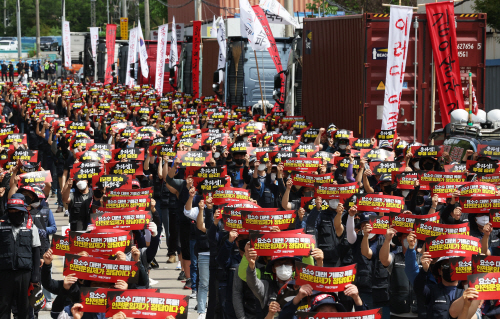 |
| Unionized truck drivers chant slogans during a rally near the Inland Container Base (ICD) in Uiwang, Gyeonggi province, on June 7, 2022./ Source: Yonhap |
AsiaToday reporter Lee Chul-hyun
South Korea’s unionized cargo truckers staged a nationwide indefinite strike as scheduled. As the government has declared to take stern response, the gap of opinion between the union and the government have not been narrowed, causing logistics disruptions in various parts of the country.
The Cargo Truckers Solidarity, affiliated with the Korean Confederation of Trade Unions (KCTU), began an indefinite strike at 12 a.m. Tuesday. Regional chapters of the truckers’ union held rallies at 10 a.m. to mark the start of the strike, with more following in the afternoon. The government estimates 8,200 drivers, or some 37 percent of the union’s 22,000 members, participated in the morning rallies.
The walkout has caused logistics disruptions at several places, especially in the cement and ready-mixed concrete industries as nearly half of the bulk cement trailer (BCT) owners belong to the Cargo Truckers Solidarity. A cement shipment at a logistics terminal in Uiwang, which supplies cement to the metropolitan area, has been interrupted by a vehicle from the Cargo Truckers Solidarity. Other cement factories located in North Chungchung and Gangwon Province have been blocked to transfer cement to other regions.
The strike is also heightening woes for steel industry. Posco said of the 49,000 metric tons of steel products shipped on daily basis, nearly 20,000 metric tons worth will be delayed due to the logistics distribution. Hyundai Steel’s Pohang factory also cancelled the shipment of 9,000 metric tons of their product.
The strike is also likely to cause a ‘liquor crisis’ during the peak summer season. The country’s largest liquor maker HiteJinro said it has temporarily suspended product shipment at its Cheongju factory.
Hydrogen vehicle drivers are expected to face difficulties to recharge their vehicles in time, since most hydrogen charging stations in the country are currently receiving hydrogen from industrial complexes through cargo vehicles equipped with hydrogen storage and transportation equipment.
The truckers are demanding to extend the Safe Trucking Freight Rates System, which guarantees minimum freight rates, claiming that it’s impossible to maintain a living. They also demand a hike in freight fares and other support measures, including the furtherance of their labor rights.
President Yoon Suk-yeol told reporters that the government would take stern response while protecting the exercise of rights permitted by the law. The Ministry of Land, Transport and Maritime Affairs said most of the country’s ports have been under normal operation and that this isn’t seen as a major setback. “We will cooperate with the police and take strict measures in accordance with laws and principles for any acts of obstruction of normal operation of vehicles that are not simple assemblies.”
The ministry said it is ready to sit down and engage in dialogue with the union for talks on their demand.
It has requested police deployment at key logistics hubs such as Busan Port and Incheon Port to prevent illegal acts by strikers, such as vehicle obstruction.
The police said they will respond sternly to any illegal acts during the strike and arrest any union members trying to disrupt the services of other non-striking truckers.
#Cargo Solidarity #cargo trucks #strike #logistics
Copyright by Asiatoday
Most Read
-
1
-
2
-
3
-
4
-
5
-
6
-
7





















